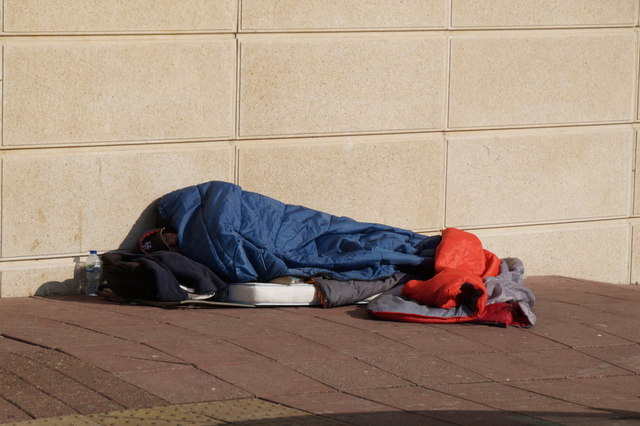
The council was wrong when it said it could not house a failed asylum seeker who was sleeping rough in Brighton, a judge has ruled.
Timon Ncube was sleeping under the arches at Brighton Station when he approached Brighton and Hove City Council for help.
But because he was a failed asylum seeker, and therefore had no recourse to public funds, Brighton and Hove City Council said he did not come under the “everyone in” scheme and they could not help.
Shelter took up his case, and they took the city council to court.
Yesterday, a high court judge ruled that the council was able to house him – and any other people in the same situation – under the pandemic guidelines.
The court heard that Mr Ncube has now been housed by the Home Office in Swindon.
Mr Ncube and Shelter argued that although he would not usually be eligible for homelessness assistance, the council was able to house him to mitigate the effect of the pandemic, and should have done so.
Mr Ncube, who fled to the UK from Zimbabwe, has diabetes which puts him at higher risk from covid, as do his age and ethnicity.
He had been living with his sister until the beginning of September last year, but was asked to leave because of overcrowding.
In September, he asked the council and the Home Office for help, but was turned down.
Shelter took up his case, and wrote to both the council and the Home Office saying it was taking legal action.
An interim order was grated in October 6, and Mr Ncube was housed by the council – but the order discontinued three days later by a high court judge.
Mr Ncube was evicted but then immediately rehoused by St Mungo’s.
Meanwhile, another court ruling said that he was eligible for public funds while the pandemic meant he was not able to return home.
He was then offered Home Office accommodation in Swindon.
Mr Ncube and Shelter argued that the emergency of the pandemic meant the council was able to offer housing to those with no recourse to public funds.
It pointed to council press releases which talked about responding to the covid emergency, and saying emergency accommodation should be available until the end of the year.
In contrast, the council’s head of housing needs Sylvia Peckham told the court that because infection rates were well below the national average, it “has not been the position of Brighton and Hove that the infection rate in its area presents an emergency or disaster at local level.”
However, Mr Justice Freedman said: “Where there was less than a national lockdown, there was still an emergency involving danger to life or reasonable ground for apprehending such an emergency, and a local authority such as the defendant was to consider whether it was of opinion that it is likely to affect the whole or part of its area or all or some of its inhabitants.
“The defendant’s publications at the time show that whilst Brighton was in a lesser tier, the situation was regarded as an emergency, and in my judgment that was a rational response.
“The relevance of this is that this gives a local authority the power to operate the Everyone In scheme or a successor initiative during the pandemic.”
Polly Neate, chief executive of Shelter – which supported Mr Ncube’s action, said: “Our services have seen first hand the cruel impact of ‘Everyone In’ not always meaning everyone.
“This judgment removes any doubt – councils should not be leaving people on the streets.”
Councillor Siriol Hugh-Jones, joint chair of Brighton and Hove City Council’s housing committee, said: “This case highlights the difficult position of councils that want to ensure people are protected regardless of their asylum status.
“In the absence of government guidance, we welcome the identification by the court of the additional, albeit limited, powers councils have to help people with no recourse to public funds (NRPF) and not entitled to support from other agencies where there is a danger to life.
“We would have preferred the government to act on our call to suspend the restrictions on assisting those with NRPF. But the court’s clarification of exactly where councils are able to offer assistance is helpful.
“We intend to use those additional powers where appropriate in all future work involving people with NRPF.
“In this case, the court also agreed with our view that the responsibility for accommodating the individual concerned lay with the Home Office rather than the council.
“At the time of the legal challenge, the individual had not applied to the Home Office. The individual has since done so and is now in accommodation provided by the Home Office.”







“the council’s head of housing needs Sylvia Peckham told the court that because infection rates were well below the national average, it “has not been the position of Brighton and Hove that the infection rate in its area presents an emergency or disaster at local level.” = that clears the matter out … Mr Ncube was a hostage in the battle between local and national funding sources .
There are Veterans who have shed blood for this country , who are on the streets , i myself , with a disabled wife , pay rent that we can`t afford ,because we can`t get a council house , i sit and watch this country dissolve . LBGT / BLM / ANIMAL RIGHTS / all groups like these take priority over those who have bled , cried , with memories of the battlefields .,,,,,
23 years in an infantry battalion , i now ask myself WHY ? . All the graves of the fallen of this country , i now ask myself WHY ? Iam ashamed to call myself BRITISH and now worry what lies ahead for my grandaughters